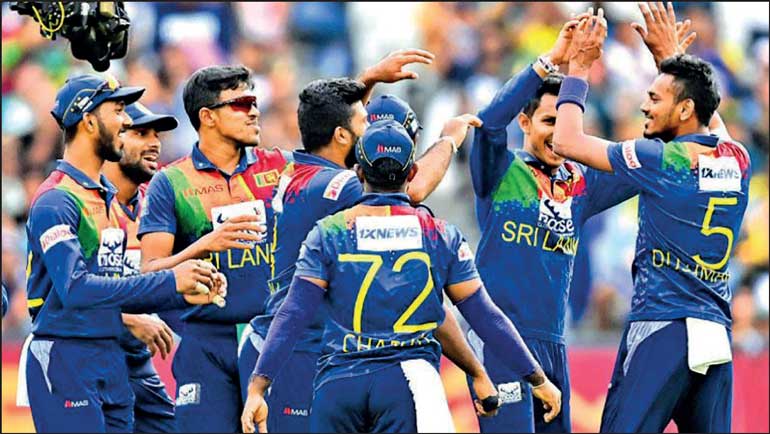Saturday Feb 28, 2026
Saturday Feb 28, 2026
Friday, 14 June 2024 00:20 - - {{hitsCtrl.values.hits}}

A few right-thinking sports ministers tried to change the constitution governing cricket in the country to address emerging issues, but they failed before the processes even commenced
 Sovereignty can generally be defined as supreme authority. In any State, sovereignty is assigned to the person, body or institution that has the ultimate authority over other people to establish a law or change existing laws. In political theory, sovereignty is a substantive term designating supreme legitimate authority over some States.
Sovereignty can generally be defined as supreme authority. In any State, sovereignty is assigned to the person, body or institution that has the ultimate authority over other people to establish a law or change existing laws. In political theory, sovereignty is a substantive term designating supreme legitimate authority over some States.
Policy implementation
At the outset a nation’s sovereignty is vested on its citizens and they use it to elect their representatives to a national assembly to carry out the affairs of the nation for a given period of time. In a democratic setup voters use their sovereign power to elect their representatives to manage the affairs for the benefit of the nation and in return be accountable to the nation on its affairs.
As a sovereign nation Sri Lanka’s progressive Government established the Sports Law (No. 25 of 1973) more than a half a century ago. Though many countries are still in the primitive stage in formulating rules of law governing the country’s sports affairs, Sports Law provided the basic mechanism to govern recognised sports in the country. This entails the appointment of officials, members to relevant councils, their duties, functions, naming organisations, registrations, fund raising, use of funds raised and dissolution of national sport associations, etc.
Such initiatives by the then Government are commendable as they empower the nation’s Auditor General, who is only accountable to the nation’s Parliament, to inquire into affairs of national bodies including their sound financial management. Such initiatives meant for eradicating unscrupulous elements from the governance of national bodies as well as unhealthy practices that can take place in handling financial and other resources available to these bodies.
The Minister for Sports was empowered to use the powers vested by the Sports Law to ensure proper governance of the national associations, including Sri Lanka Cricket. Parliamentary Committee on Public Enterprises was also given the power to review the affairs of national associations of sports when appropriate to do so. COPE also uses the reports from the Auditor General when serious issues were raised by them to question the relevant officials in order to ensure the nation’s expectations are met through the affairs of national sport associations.
Elections of office bearers
Officials from relevant sports clubs were given the voting rights to elect office bearers to respective national sport associations. It appears that this process has been the biggest predicament experienced lately to get suitable office bearers elected to the national cricket body due to backroom manipulations by scoundrel individuals or groups. The biggest manipulation was the establishment of national sports clubs where only a couple of individuals, or a tightly knit group become the sole membership in order to get the voting rights to cast the votes in the election of the national sports association. It is rumoured that some of the clubs don’t even have facilities such as grounds to practice or/and play cricket. Such dealings were the root causes that led to the current status of unethical practices throughout the governing mechanism of the sport.
It is common knowledge that National Cricket bodies governed by professionals who engaged in various stages of the game in the past maintained a mutually beneficial relationship with the Minister in the process of gaining the official test status prior to winning the Cricket World Cup in 1996. Whoever witnessed the progress of the international cricket in the country may have noticed that deterioration of the governance commenced after SLC became the richest sports body in the country.
A few right-thinking sports ministers tried to change the constitution governing cricket in the country to address emerging issues, but they failed before the processes even commenced. It appears that even the International Cricket Council (ICC) sighted or considered such progressive initiatives by the Minister as political interference of the governance of the sports body though the Minister was vested with all the necessary powers through legislations to force the members to put the affairs of sports bodies in the country on the correct path.
ICC as an international governing body
ICC comprises of representatives of recognised national cricketing associations throughout the world. Their responsibility should be embracing the mechanisms established by each nation to govern their sport bodies and facilitate its operations and not to become an impediment by trying to impose feeble practices of some member countries even though their admin mechanisms are primitive and basic. Such interferences have led to provide opportunities to unscrupulous individuals to use the sport for their own glorification and reaping unwarranted benefits.
 Some member countries may have primitive mechanisms to govern their sports, but Sri Lanka has established one of the best mechanisms to govern all major sports in the country though other nations, how big they are or how long they played the sport at international level, still leave room for manipulation of the process of the game at every level by opting not to introduce progressive reforms.
Some member countries may have primitive mechanisms to govern their sports, but Sri Lanka has established one of the best mechanisms to govern all major sports in the country though other nations, how big they are or how long they played the sport at international level, still leave room for manipulation of the process of the game at every level by opting not to introduce progressive reforms.
Cricket as a revenue raiser
Cricket has become a formidable revenue raiser during the last three decades like the other major international sports. Evidence from current corruption cases being investigated suggests that even bookmakers in South Asia have become a formidable force to manipulate the game of cricket and possibly influence the processes to get their agents elected to the management of professional bodies. According to hearsay evidence some premier leagues are known for inadvertently facilitating money laundering, match fixing and other corrupt practices.
Irony is that these unscrupulous elements go beyond their mandate to influence or sabotage corrective actions taken by relevant authorities in member nations. Former Minister for Sports, who was given the power to act by the country’s sovereign authority, started taking decisive actions by appointing an interim committee to administer the affairs of SLC based on the factual evidence offered to him by the Auditor General and other independent authorities.
However, ICC was on the war path with the Minister claiming his actions as political interference. ICC immediately suspended the membership of SLC and acted as the biggest impediment to address the malpractices within SLC. Mockery was that even the President of the country was undermining the actions of his own Minister and opted to behave like in the old adage ‘King Kekille’ (joker king) by giving statements to foreign journalists contradicting the actions taken by the Sports Minister. Such controversies are clear evidence to demonstrate that unhealthy practices in the system are capable of even dividing the country’s national governing mechanism to pursue their hidden intentions. Outcome was that every initiative taken, and processes led to appropriate actions by the Minister appointed by the sovereign authority of the country was disrupted by unsubstantiated actions taken by ICC.
Manipulation of governance of cricket administration resulted in Sri Lanka losing a right-minded Minister and parachuting a new Minister who has already proven to be a failure in combating unhealthy practices in cricket administration as the responsible Minister in the past. Though few capable individuals tried to steer SLC on the right path but failed even before implementing decisive changes in the administration of the game.
Question is how long these episodes are allowed to be continued to tarnish the image of the sport and distancing its much-loved followers from the game. Even many months already lapsed after the latest episode it was clear that nothing has taken place to clear the impediments in the system for proper management of SLC for the benefit of all of its stakeholders. Unfortunately, even mainstream and social media which highlighted malpractices of the game had become dormant on this matter of national interest. Unless otherwise stern actions are taken to remove the possible impediments, the game will continue to be a ‘gravy train’ for some deceitful individuals.
Nothing has gone precise in the spirit of the game after the head office of ICC moved from cooler clime to a warmer region. Once touted as the Gentlemen’s game, it now appears to be heading towards its own destruction creating a misery for its followers.
Dreadful consequences
Though it is still at an early stage, ultimate casualty of these malpractices will be the game of cricket enjoyed by the majority of the spectators in South Asian nations as they will lose their right to enjoy the game and support their teams competing in the international arena, perhaps being the only formidable game these countries play at that level. Fascinating to watch lately that new cricketing nations are embracing the game and already exhibiting their competitive edge to meet competence already developed by established cricketing nations.
Social fabrics and governing ethos in Western environments would not permit the manipulation of their beloved game of cricket and will continue to provide entertainment for their followers like they did for more than a century.
Unless right thinking member nations of ICC, as a formidable force, take decisive actions to put the administration of the game on the right path, rather than becoming mere spectators of the decisions taken by ICC, the damage being done to the game would be irreversible. Nations committed for the betterment of the game should admire and possibly follow those mechanisms established by some member nations to rid unhealthy practices in the sport rather than allow placing impediments to progressive steps taken by those member countries.
(The writer is a graduate from the University of Sri Jayewardenepura, as well as from Sri Lanka Law College and completed his postgraduate studies in Australia and Canada. He is a visiting lecturer of the Master of Business Administration program at the Sydney Business School and currently working for the Australian Government. He can be reached via email: [email protected].)